|
[Previous
Page]
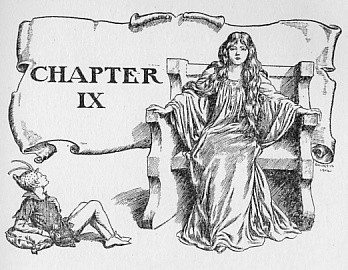
AFTER THE PARTY
|
"Stepharto. This will prove a brave kingdom to
me,
Where I shall have my music for nothing."
The Tempest. |
WHEN breakfast was
over, the guests got up, one after the other, without taking the least
notice of the Queen; and the tent began to get so thin and transparent
that you could see the trees and the sky through it. At last, it looked
only like a coloured mist, with blue, and green, and yellow stripes, and
then it was gone; and the table and all the things on it began to go in
the same way. Only Jack, and the applewoman, and Mopsa were left, sitting
on their chairs, with the Queen between them.
Presently, the Queen's lips began to move, and her eyes
looked straight before her, as she sat upright in her chair.
Whereupon the applewoman snatched up Mopsa, and, seizing Jack's hand,
hurried him off, exclaiming. "Come away! come away! She is
going to tell one of her stories; and if you listen, you'll be obliged to
go to sleep, and sleep nobody knows how long."
Jack did not want to go to sleep; he wished to go down to the
river again, and see what had become of his boat, for he had left his cap
and several other things in it.
So he parted from the applewoman—who took Mopsa with her, and
said he would find her again when he wanted her at her apple-stall—and
went down to the boat, where he saw that his faithful hound was there
before him.
"It was lucky, master, that I came when I did," said the
hound, "for a dozen or so of those one-foot-one fellows were just shoving
it off, and you will want it at night to sleep in."
"Yes," said Jack; "and I can stretch the bit of purple silk
to make a canopy over head—a sort of awning—for I should not like to sleep
in tents or palaces that are inclined to melt away."
So the hound with his teeth, and Jack with his hands, pulled
and pulled at the silk till it was large enough to make a splendid canopy,
like a tent; and it reached down to the water's edge, and roofed in all
the after part of the boat.
So now he had a delightful little home of his own; and there
was no fear of its being blown away, for no wind ever blows in Fairyland.
All the trees are quite still, no leaf rustles, and the flowers lie on the
ground exactly where they fall.
After this Jack told the hound to watch his boat, and went
himself in search of the applewoman. Not one fairy was to be seen,
any more than if he had been in his own country, and he wandered down the
green margin of the river till he saw the applewoman sitting at a small
stall with apples on it, and cherries tied to sticks, and some dry-looking
nuts. She had Mopsa on her knee, and had washed her face, and put a
beautiful clean white frock on her.
"Where are all the fairies gone to?" asked Jack.
"I never take any notice of that common trash and their
doings," she answered. "When the Queen takes to telling her stories
they are generally frightened, and go and sit in the tops of the trees."
"But you seem very fond of Mopsa," said Jack, "and she is one
of them. You will help me to take care of her, won't you, till she
grows a little older?"
"Grows!" said the applewoman, laughing. "Grows!
Why you don't think, surely, that she will ever be any different from what
she is now!"
"I thought she would grow up," said Jack.
"They never change so long as they last," answered the
applewoman, "when once they are one-foot-one high."
"Mopsa," said Jack, "come here, and I'll measure you."
Mopsa came dancing towards Jack, and he tried to measure her,
first with a yard measure that the applewoman took out of her pocket, and
then with a stick, and then with a bit of string; but Mopsa would not
stand steady, and at last it ended in their having a good game of romps
together, and a race; but when he carried her back, sitting on his
shoulder, he was sorry to see that the applewoman was crying again, and he
asked her kindly what she did it for.
"It is because," she answered, "I shall never see my own
country any more, nor any men and women and children, excepting such as by
a rare chance stray in for a little while as you have done."
"I can go back whenever I please," said Jack. "Why
don't you?"
"Because I came in of my own good-will, after I had had fair
warning that if I came at all it would end in my staying always.
Besides, I don't know that I exactly wish to go home again—I should be
afraid."
"Afraid of what?" asked Jack.
"Why, there's the rain and the cold, and not having anything
to eat excepting what you earn. And yet," said the applewoman, "I
have three boys of my own at home; one of them must be nearly a man by
this time, and the youngest is about as old as you are. If I went
home I might find one or more of those boys in jail, and then how
miserable I should be."
"But you are not happy as it is," said Jack. "I have
seen you cry."
"Yes," said the applewoman; "but now I live here I don't care
about anything so much as I used to do. 'May I have a satin gown and
a coach?' I asked when first I came. 'You may have a hundred and
fifty satin gowns if you like,' said the Queen, 'and twenty coaches with
six cream-coloured horses to each.' But when I had been here a
little time, and found I could have everything I wished for, and change it
as often as I pleased, I began not to care for anything; and at last I got
so sick of all their grand things that I dressed myself in my own clothes
that I came in, and made up my mind to have a stall and sit at it, as I
used to do, selling apples. And I used to say to myself, 'I have but
to wish with all my heart to go home, and I can go, I know that;' but oh
dear! oh dear! I couldn't wish enough, for it would come into my head that
I should be poor, or that my boys would have forgotten me, or that my
neighbours would look down on me, and so I always put off wishing for
another day. Now here is the Queen coming. Sit down on the
grass and play with Mopsa. Don't let her see us talking together,
lest she should think I have been telling you things which you ought not
to know."
Jack looked, and saw the Queen coming slowly towards them,
with her hands held out before her, as if it was dark. She felt her
way, yet her eyes were wide open, and she was telling her stories all the
time.
"Don't you listen to a word she says," whispered the
applewoman, and then, in order that Jack might not hear what the Queen was
talking about, she began to sing.
She had no sooner begun than up from the river came swarms of
one-foot-one fairies to listen, and hundreds of them dropped down from the
trees. The Queen, too, seemed to attend as they did, though she kept
murmuring her story all the time; and nothing that any of them did
appeared to surprise the applewoman—she sang as if nobody was taking any
notice at all:
|
"When I sit on market-days amid the comers and the
goers,
Oh! full oft I have a vision of the days without alloy,
And a ship comes up the river with a jolly gang of towers,
And a 'pull'e haul'e, pull'e haul'e, yoy! heave, hoy!'
"There is busy talk around me, all about mine ears it hummeth,
But the wooden wharves I look on, and a dancing, heaving buoy,
For 'tis tidetime in the river, and she cometh—oh, she cometh !
With a 'pull'e haul'e, pull'e haul'e, yoy! heave, hoy!'
"Then I hear the water washing, never golden waves were brighter,
And I hear the capstan creaking—'tis a sound that cannot cloy.
Bring her to, to ship her lading, brig or schooner, sloop or lighter,
With a 'pull'e haul'e, pull'e haul'e, yoy! heave, hoy!'
"'Will ye step aboard, my dearest? for the high seas lie before us.'
So I sailed adown the river in those days without alloy.
We are launched! But when, I wonder, shall a sweeter sound
float o'er us
Than yon 'pull'e haul'e, pull'e haul'e, yoy! heave hoy!'" |
As the applewoman left off singing, the Queen moved away,
still murmuring the words of her story, and Jack said:
"Does the Queen tell stories of what has happened, or of what
is going to happen?"
"Why, of what is going to happen, of course," replied the
woman, "Anybody could tell the other sort."
"Because I heard a little of it," observed Jack. "I
thought she was talking of me. She said, 'So he took the measure,
and Mopsa stood still for once, and he found she was only one foot high,
and she grew a great deal after that. Yes, she can grow.'"
"That's a fine hearing, and a strange hearing," said the
applewoman; "and what did she mutter next?"
"Of how she heard me sobbing," replied Jack; "and while you
went on about stepping on board the ship, she said, 'He was very good to
me, dear little fellow! But Fate is the name of my old mother, and
she reigns here. Oh, she reigns! The fatal F is in her name,
and I cannot take it out! '"
"Ah!" replied the applewoman, "they all say that, and that
they are fays, and that mortals call their history fable; they are always
crying out for an alphabet without the fatal F."
"And then she told how she heard Mopsa sobbing too," said
Jack; "sobbing among the reeds and rushes by the river side."
"There are no reeds and no rushes either here," said the
applewoman, "and I have walked the river from end to end. I don't
think much of that part of the story. But you are sure she said that
Mopsa was short of her proper height?"
"Yes, and that she would grow; but that's nothing. In
my country we always grow."
"Hold your tongue about your country!" said the applewoman,
sharply. "Do you want to make enemies of them all?"
Mopsa had been listening to this, and now she said, "I don't
love the Queen. She slapped my arm as she went by, and it hurts."
Mopsa showed her little fat arm as she spoke, and there was a
red place on it.
"That's odd too," said the applewoman; "there's nothing red
in a common fairy's veins. They have sap in them: that's why they
can't blush."
Just then the sun went down, and Mopsa got up on the
applewoman's lap and went to sleep; and Jack, being tired, went to his
boat and lay down under the purple canopy, his old hound lying at his feet
to keep guard over him.
The next morning, when he woke, a pretty voice called to him,
"Jack! Jack!" and he opened his eyes and saw Mopsa. The
applewoman had dressed her in a clean frock and blue shoes, and her hair
was so long! She was standing on the landing-place, close to him.
"O Jack! I'm so big," she said. "I grew in the night; look at me."
Jack looked. Yes, Mopsa had grown indeed; she had only
just reached to his knee the day before, and now her little bright head,
when he measured her, came as high as the second button of his waistcoat.
"But I hope you will not go on growing so fast as this," said
Jack, "or you will be as tall as my mamma is in a week or two—much too big
for me to play with."
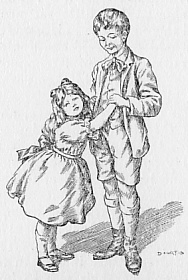
And now her bright little head . . . came as high as
the second button of his waistcoat.
_______________
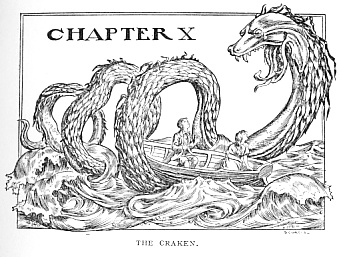
MOPSA LEARNS HER LETTERS
"HOW ashamed I am,"
Jack said, "to think that you don't know even your letters!"
Mopsa replied that she thought that did not signify, and then
she and Jack began to play at jumping from the boat on to the bank, and
back again; and afterwards, as not a single fairy could be seen, they had
breakfast with the applewoman.
"Where is the Queen?" asked Jack.
The applewoman answered, "It's not the fashion to ask
questions in Fairyland."
"That's a pity," said Jack, "for there are several things
that I particularly want to know about this country. Mayn't I even
ask how big it is?"
"How big?" said Mopsa—little Mopsa looking as wise as
possible. "Why, the same size as your world, of course."
Jack laughed. "It's the same world that you call
yours," continued Mopsa; "and when I'm a little older, I'll explain it all
to you."
"If it's our world," said Jack, "why are none of us in it,
excepting me and the applewoman?"
"That's because you've got something in your world that you
call TIME," said Mopsa; "so you talk about
NOW, and you talk about THEN."
"And don't you?" asked Jack.
"I do if I want to make you understand," said Mopsa.
The applewoman laughed, and said, "To think of the pretty
thing talking so queen-like already! Yes, that's right, and just
what the grown-up fairies say. Go on, and explain it to him if you
can."
"You know," said Mopsa, "that your people say there was a
time when there were none of them in the world—a time before they were
made. Well, THIS is that time. This
IS long ago."
"Nonsense!" said Jack. "Then how do I happen to be
here?"
"Because," said Mopsa, "when the albatross brought you, she
did not fly with you a long way off, but a long way back—hundreds and
hundreds of years. This is your world, as you can see; but none of
your people are here, because they are not made yet. I don't think
any of them will be made for a thousand years."
"But I saw the old ships," answered Jack, "in the enchanted
bay."
"That was a border country," said Mopsa. "I was asleep
while you went through those countries; but these are the real
Fairylands."
Jack was very much surprised when he heard Mopsa say these
strange things; and as he looked at her, he felt that a sleep was coming
over him, and he could not hold up his head. He felt how delightful
it was to go to sleep; and though the applewoman sprang to him, when she
observed that he was shutting his eyes, and though he heard her begging
and entreating him to keep awake, he did not want to do so; but he let his
head sink down on the mossy grass, which was as soft as a pillow, and
there under the shade of a Guelder rose-tree, that kept dropping its white
flowrets all over him, he had this dream.
He thought that Mopsa came running up to him, as he stood by
the river, and that he said to her, "Oh, Mopsa, how old we are! We
have lived back to the times before Adam and Eve!"
"Yes," said Mopsa; "but I don't feel old. Let us go
down the river, and see what we can find."
So they got into the boat, and it floated into the middle of
the river, and then made for the opposite bank, where the water was warm
and very muddy, and the river became so very wide that it seemed to be
afternoon when they got near enough to see it clearly; and what they saw
was a boggy country, green, and full of little rills, but the water—which,
as I told you, was thick and muddy—the water was full of small holes!
You never saw water with eyelet-holes in it; but Jack did. On all
sides of the boat he saw holes moving about in pairs, and some were so
close that he looked and saw their lining; they were lined with pink, and
they snorted! Jack was afraid, but he considered that this was such
a long time ago that the holes, whatever they were, could not hurt him;
but it made him start, notwithstanding, when a huge flat head reared
itself up close to the boat, and he found that the holes were the nostrils
of creatures who kept all the rest of themselves under water.
In a minute or two, hundreds of ugly flatheads popped up, and
the boat danced among them as they floundered about in the water.
"I hope they won't upset us," said Jack. "I wish you
would land."
Mopsa said she would rather not, because she did not like the
hairy elephants.
"There are no such things as hairy elephants," said Jack, in
his dream; but he had hardly spoken when out of a wood close at hand some
huge creatures, far larger than our elephants, came jogging down to the
water. There were forty or fifty of them, and they were covered with
what looked like tow. In fact, so coarse was their shaggy hair that
they looked as if they were dressed in door-mats; and when they stood
still and shook themselves, such clouds of dust flew out that, as it swept
over the river, it almost stifled Jack and Mopsa.
"Odious!" exclaimed Jack, sneezing. "What terrible
creatures these are!"
"Well," answered Mopsa, at the other end of the boat (but he
could hardly see her for the dust), "then why do you dream of them?"
Jack had just decided to dream of something else, when, with
a noise greater than fifty trumpets, the elephants, having shaken out all
the dust, came thundering down to the water to bathe in the liquid mud.
They shook the whole country as they plunged; but that was not all.
The awful river-horses rose up, and, with shrill screams, fell upon them,
and gave them battle; while up from every rill peeped above the rushes
frogs as large as oxen, and with blue and green eyes that gleamed like the
eyes of cats.
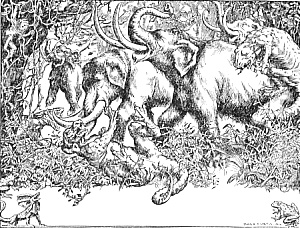
"The awful river-horses rose up and, with shrill
screams, fell upon them."
The frogs' croaking, and the shrill trumpeting of the
elephants, together with the cries of the river-horses, as all these
creatures fought with horn and tusk, and fell on one another, lashing the
water into whirlpools, among which the boat danced up and down like a
cork—the blinding spray, and the flapping about of great bats over the
boat and in it—so confused Jack that Mopsa had spoken to him several times
before he answered.
"O Jack! " she said at last; "if you can't dream any better,
I must call the Craken."
"Very well," said Jack. "I'm almost wrapped up and
smothered in bats' wings, so call anything you please."
Thereupon Mopsa whistled softly, and in a minute or two he
saw, almost spanning the river, a hundred yards off, a thing like a
rainbow, or a slender bridge, or still more, like one ring or coil of an
enormous serpent; and presently the creature's head shot up like a
fountain, close to the boat, almost as high as a ship's mast. It was
the Craken; and when Mopsa saw it, she began to cry, and said, "We are
caught in this crowd of creatures, and we cannot get away from the land of
dreams. Do help us, Craken."
Some of the bats that hung to the edges of the boat had wings
as large as sails, and the first thing the Craken did was to stoop its
lithe neck, pick two or three of them off, and eat them.
"You can swim your boat home under my coils where the water
is calm," the Craken said, "for she is so extremely old now, that if you
do not take care she will drop to pieces before you get back to the
present time."
Jack knew it was of no use saying anything to this formidable
creature, before whom the river-horses and the elephants were rushing to
the shore; but when he looked and saw down the river rainbow behind
rainbow—I mean coil behind coil—glittering in the sun, like so many
glorious arches that did not reach to the banks, he felt extremely glad
that this was a dream, and besides that, he thought to himself, "It's only
a fabled monster."
"No, it's only a fable to these times," said Mopsa, answering
his thought; "but in spite of that we shall have to go through all the
rings."
They went under one—silver, green, and blue, and gold.
The water dripped from it upon them, and the boat trembled, either because
of its great age, or because it felt the rest of the coil underneath.
A good way off was another coil, and they went so safely
under that, that Jack felt himself getting used to Crakens, and not
afraid. Then they went under thirteen more. These kept getting
nearer and nearer together, but, besides that, the fourteenth had not
quite such a high span as the former ones; but there were a great many to
come, and yet they got lower and lower.
Both Jack and Mopsa noticed this, but neither said a word.
The thirtieth coil brushed Jack's cap off, then they had to stoop to pass
under the two next, and then they had to lie down in the bottom of the
boat, and they got through with the greatest difficulty; but still before
them was another! The boat was driving straight towards it, and it
lay so close to the water that the arch it made was only a foot high.
When Jack saw it, he called out, "No! that I cannot bear. Somebody
else may do the rest of this dream. I shall jump overboard!"
Mopsa seemed to answer in quite a pleasant voice, as if she
was not afraid:
"No, you'd much better wake." And then she went on,
"Jack! Jack! why don't you wake?"
Then all on a sudden Jack opened his eyes, and found that he
was lying quietly on the grass, that little Mopsa really had asked him why
he did not wake. He saw the Queen too, standing by, looking at him,
and saying to herself, "I did not put him to sleep. I did not put
him to sleep."
"We don't want any more stories to-day, Queen," said the
applewoman, in a disrespectful tone, and she immediately began to sing,
clattering some tea-things all the time, for a kettle was boiling on some
sticks, and she was going to make tea out of doors:
|
"The marten flew to the finch's nest,
Feathers, and moss, and a wisp of hay:
'The arrow it sped to thy brown mate's breast;
Low in the broom is thy mate to-day.'
"'Liest thou low, love? low in the broom?
Feathers and moss, and a wisp of hay,
Warm the white eggs till I learn his doom.'
She beateth her wings, and away, away.
"'Ah, my sweet singer, thy days are told
(Feathers and moss, and a wisp of hay)!
Thine eyes are dim, and the eggs grow cold.
O mournful morrow! O dark to-day!'
"The finch flew back to her cold, cold nest,
Feathers and moss, and a wisp of hay.
Mine is the trouble that rent her breast,
And home is silent, and love is clay." |
Jack felt very tired indeed—as much tired as if he had really
been out all day on the river, and gliding under the coils of the Craken.
He however rose up, when the applewoman called him, and drank his tea, and
had some fairy bread with it, which refreshed him very much.
After tea he measured Mopsa again, and found that she had
grown up to a higher button. She looked much wiser too, and when he
said she must be taught to read she made no objection, so he arranged
daisies and buttercups into the forms of the letters, and she learnt
nearly all of them that one evening, while crowds of the one-foot-one
fairies looked on, hanging from the boughs and sitting in the grass, and
shouting out the names of the letters as Mopsa said them. They were
very polite to Jack, for they gathered all these flowers for him, and
emptied them from their little caps at his feet as fast as he wanted them.
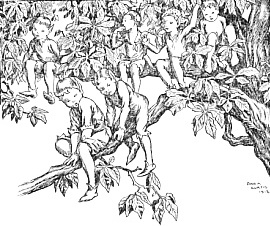
"While crowds of one-foot-one fairies looked on
hanging from the boughs."
_______________
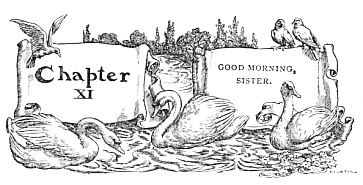
"Sweet is childhood—childhood's over,
Kiss and part.
Sweet is youth; but youth's a rover—
So's my heart.
Sweet is rest; but by all showing
Toil is nigh.
We must go. Alas! the going,
Say 'good-bye.'" |
JACK crept under his
canopy, went to sleep early that night, and did not wake till the sun had
risen, when the applewoman called him, and said breakfast was nearly
ready.
The same thing never happens twice in Fairyland, so this time
the breakfast was not spread in a tent, but on the river. The Queen
had cut off a tiny piece of her robe, the one-foot-one fairies had
stretched it till it was very large, and then they had spread it on the
water, where it floated and lay like a great carpet of purple and gold.
One corner of it was moored to the side of Jack's boat; but he had not
observed this, because of his canopy. However, that was now looped
up by the applewoman, and Jack and Mopsa saw what was going on.
Hundreds of swans had been towing the carpet along, and were
still holding it with their beaks, while a crowd of doves walked about on
it, smoothing out the creases and patting it with their pretty pink feet
till it was quite firm and straight. The swans then swam away, and
they flew away.
Presently troops of fairies came down to the landing-place,
jumped into Jack's boat without asking leave, and so got on to the carpet,
while at the same time a great tree which grew on the bank began to push
out fresh leaves, as large as fans, and shoot out long branches, which
again shot out others, till very soon there was shade all over the
carpet—a thick shadow as good as a tent, which was very pleasant, for the
sun was already hot.
When the Queen came down, the tree suddenly blossomed out
with thousands of red and white flowers.
"You must not go on to that carpet," said the applewoman;
"let us sit still in the boat, and be served here." She whispered
this as the Queen stepped into the boat.
"Good morning, Jack," said the Queen. "Good morning,
dear." This was to the applewoman; and then she stood still for a
moment and looked earnestly at little Mopsa, and sighed.
"Well," she said to her, "don't you mean to speak to me?"
Then Mopsa lifted up her pretty face and blushed very rosy red, and said,
in a shy voice, "Good morning sister."
"I said so!" exclaimed the Queen; "I said so!" and she lifted
up her beautiful eyes, and murmured out, "What is to be done now?"
"Never mind, Queen dear," said Jack. "If it was rude of
Mopsa to say that, she is such a little young thing that she does not know
better."
"It was not rude," said Mopsa, and she laughed and blushed
again. "It was not rude, and I am not sorry."
As she said this the Queen stepped on to the carpet, and all
the flowers began to drop down. They were something like camellias,
and there were thousands of them.
The fairies collected them in little heaps. They had no
tables and chairs, nor any plates and dishes, for this breakfast; but the
Queen sat down on the carpet close to Jack's boat, and leaned her cheek on
her hand, and seemed to be lost in thought. The fairies put some
flowers into her lap, then each took some, and they all sat down and
looked at the Queen, but she did not stir.
At last Jack said, "When is the breakfast coming?"
"This is the breakfast," said the applewoman; "these flowers
are most delicious eating. You never tasted anything so good in your
life; but we don't begin till the Queen does."
Quantities of blossoms had dropped into the boat.
Several fairies tumbled into it almost head over heels, they were in such
a hurry, and they heaped them into Mopsa's lap, but took no notice of
Jack, nor of the applewoman either.
At last, when every one had waited some time, the Queen
pulled a petal off one flower, and began to eat, so every one else began;
and what the applewoman had said was quite true. Jack knew that he
never had tasted anything half so nice, and he was quite sorry when he
could not eat any more. So, when every one had finished, the Queen
leaned her arm on the edge of the boat, and, turning her lovely face
towards Mopsa, said, "I want to whisper to you, sister."
"Oh!" said Mopsa, "I wish I was in Jack's waistcoat pocket
again; but I'm so big now." And she took hold of the two sides of
his velvet jacket, and hid her face between them.
"My old mother sent a message last night," continued the
Queen, in a soft, sorrowful voice. "She is much more powerful than
we are."
"What is the message?" asked Mopsa; but she still hid her
face.
So the Queen moved over, and put her lips close to Mopsa's
ear, and repeated it: "There cannot be two queens in one hive."
"If Mopsa leaves the hive, a fine swarm will go with her,"
said the applewoman. "I shall, for one; that I shall!"
"No!" answered the Queen. "I hope not, dear; for you
know well that this is my old mother's doing, not mine."
"Oh!" said Mopsa; "I feel as if I must tell a story too, just
as the Queen does." But the applewoman broke out in a very cross
voice, " It's not at all like Fairyland, if you go on in this way, and I
would as lieve be out of it as in it." Then she began to sing, that
she and Jack might not hear Mopsa's story: "
|
"On the rocks by Aberdeen,
Where the whislin' wave had been,
As I wandered and at e'en
Was
eerie;
There I saw thee sailing west,
And I ran with joy opprest—
Ay, and took out all my best,
My
dearie.
"Then I busked mysel' wi' speed,
And the neighbours cried, 'What need?
'Tis a lass in any weed
Aye
bonny!'
Now my heart, my heart is sair.
What's the good, though I be fair,
For thou'lt never see me mair,
Man
Johnnie! |
While the applewoman sang Mopsa finished her story; and the
Queen untied the fastening which held her carpet to the boat, and went
floating upon it down the river.
"Good-bye," she said, kissing her hand to them. "I must
go and prepare for the deputation."
So Jack and Mopsa played about all the morning, sometimes in
the boat and sometimes on the shore, while the applewoman sat on the
grass, with her arms folded, and seemed to be lost in thought. At
last she said to Jack, "What was the name of the great bird that carried
you two here?"
"I have forgotten," answered Jack. "I've been trying to
remember ever since we heard the Queen tell her first story, but I
cannot."
"I remember," said Mopsa.
"Tell it, then," replied the applewoman; but Mopsa shook her
head.
"I don't want Jack to go," she answered.
"I don't want to go, nor that you should," said Jack.
"But the Queen said, 'there cannot be two Queens in one
hive,' and that means that you are going to be turned out of this
beautiful country."
"The other fairy lands are just as nice," answered Mopsa;
"she can only turn me out of this one."
"I never heard of more than one Fairyland," observed Jack.
"It's my opinion," said the applewoman, "that there are
hundreds! And those one-foot-one fairies are such a saucy set, that
if I were you I should be very glad to get away from them. You've
been here a very little while as yet, and you've no notion what goes on
when the leaves begin to drop."
"Tell us," said Jack.
"Well, you must know," answered the applewoman, "that fairies
cannot abide cold weather; so, when the first rime frost comes, they bury
themselves."
"Bury themselves?" repeated Jack.
"Yes, I tell you, they bury themselves. You've seen
fairy rings, of course, even in your own country; and here the fields are
full of them. Well, when it gets cold a company of fairies forms
itself into a circle, and every one digs a little hole. The first
that has finished jumps into his hole, and his next neighbour covers him
up, and then jumps into his own little hole, and he gets covered up in his
turn, till at last there is only one left, and he goes and joins another
circle, hoping he shall have better luck than to be last again. I've
often asked them why they do that, but no fairy can ever give a reason for
anything. They always say that old Mother Fate makes them do it.
When they come up again, they are not fairies at all, but the good ones
are mushrooms, and the bad ones are toadstools."
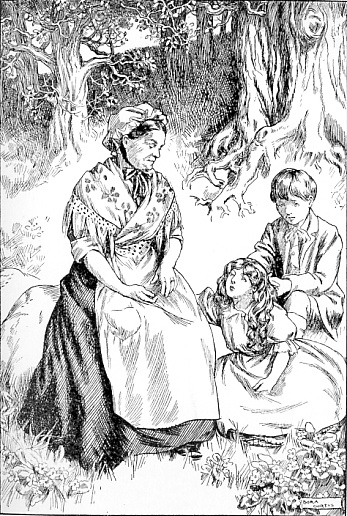
"Well, you must know," answered the applewoman, "that
fairies cannot abide cold weather."
"Then you think there are no one-foot-one fairies in the
other countries?" said Jack. "Of course not," answered the
applewoman; "all the fairy lands are different. It's only the queens
that are alike."
"I wish the fairies would not disappear for hours," said
Jack. "They all seem to run off and hide themselves."
"That's their way," answered the applewoman. "All
fairies are part of their time in the shape of human creatures, and the
rest of it in the shape of some animal. These can turn themselves,
when they please, into Guinea-fowl. In the heat of the day they
generally prefer to be in that form, and they sit among the leaves of the
trees.
"A great many are now with the Queen, because there is a
deputation coming; but if I were to begin to sing, such a flock of
Guinea-hens would gather round, that the boughs of the trees would bend
with their weight, and they would light on the grass all about so thickly
that not a blade of grass would be seen as far as the song was heard."
So she began to sing, and the air was darkened by great
flocks of these Guinea-fowl. They alighted just as she had said, and
kept time with their heads and their feet, nodding like a crowd of
mandarins; and yet it was nothing but a stupid old song that you would
have thought could have no particular meaning for them.
|
LIKE A LAVEROCK IN THE LIFT
I
It's we two, it's we two, it's we two for aye,
All the world and we two, and Heaven be our stay.
Like a laverock in the lift, sing, O bonny bride!
All the world was Adam once, with Eve by his side.
II
What's the world, my lass, my love! what can it do?
I am thine, and thou art mine; life is sweet and new.
If the world have missed the mark, let it stand by,
For we two have gotten leave, and once more we'll try.
III
Like a laverock in the lift, sing, O bonny bride!
It's we two, it's we two, happy side by side.
Take a kiss from me thy man; now the song begins:
" All is made afresh for us, and the brave heart wins."
IV
When the darker days come, and no sun will shine,
Thou shalt dry my tears, lass, and I'll dry thine.
It's we two, it's we two, while the world's away,
Sitting by the golden sheaves on our wedding-day. |
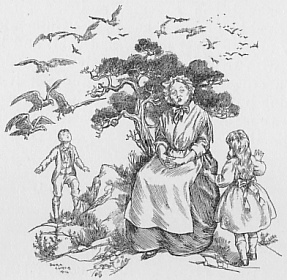
"So she began to sing."
_______________
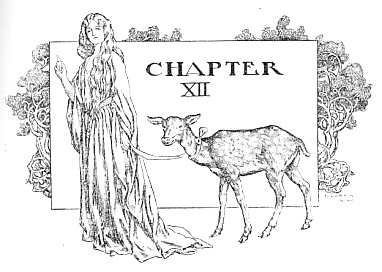
THEY RUN AWAY FROM OLD MOTHER FATE
|
"A land that living warmth disowns,
It meets my wondering ken;
A land where all the men are stones,
Or all the stones are men." |
BEFORE the applewoman
had finished, Jack and Mopsa saw the Queen coming in great state, followed
by thousands of the one-foot-one fairies, and leading by a ribbon round
its neck a beautiful brown doe. A great many pretty fawns were
walking among the fairies.
"Here's the deputation," said the applewoman; but as the
Guinea-fowl rose like a cloud at the approach of the Queen, and the
fairies and fawns pressed forward, there was a good deal of noise and
confusion, during which Mopsa stepped up close to Jack and whispered in
his ear, "Remember, Jack, whatever you can do you may do."
Then the brown doe laid down at Mopsa's feet, and the Queen
began:
"Jack and Mopsa, I love you both. I had a message last
night from my old mother, and I told you what it was."
"Yes, Queen," said Mopsa, "you did."
"And now," continued the Queen, "she has sent this beautiful
brown doe from the country beyond the lake, where they are in the greatest
distress for a queen, to offer Mopsa the crown; and, Jack, it is fated
that Mopsa is to reign there, so you had better say no more about it."
"I don't want to be a queen," said Mopsa, pouting; "I want to
play with Jack."
"You are a queen already," answered the real Queen; "at
least, you will be in a few days. You are so much grown, even since
the morning, that you come up nearly to Jack's shoulder. In four
days you will be as tall as I am; and it is quite impossible that any one
of fairy birth should be as tall as a queen in her own country."
"But I don't see what stags and does can want with a queen,"
said Jack.
"They were obliged to turn into deer," said the Queen, "when
they crossed their own border; but they are fairies when they are at home,
and they want Mopsa, because they are always obliged to have a queen of
alien birth."
"If I go," said Mopsa, "shall Jack go too?"
"Oh, no," answered the Queen; "Jack and the applewoman are my
subjects."
"Applewoman," said Jack, "tell us what you think; shall Mopsa
go to this country?"
"Why, child," said the applewoman, "go away from here she
must; but she need not go off with the deer, I suppose, unless she likes.
They look gentle and harmless; but it is very hard to get at the truth in
this country, and I've heard queer stories about them."
"Have you?" said the Queen. "Well you can repeat them
if you like; but remember that the poor brown doe cannot contradict them."
So the applewoman said, "I have heard, but I don't know how
true it is, that in that country they shut up their queen in a great
castle, and cover her with a veil, and never let the sun shine on her; for
if by chance the least little sunbeam should light on her she would turn
into a doe directly, and all the nation would turn with her, and stay so."
"I don't want to be shut up in a castle," said Mopsa.
"But is it true?" asked Jack.
"Well," said the applewoman, "as I told you before, I cannot
make out whether it's true or not, for all these stags and fawns look very
mild, gentle creatures."
"I won't go," said Mopsa; "I would rather run away."
All this time the Queen with the brown doe had been gently
pressing with the crowd nearer and nearer to the brink of the river, so
that now Jack and Mopsa, who stood facing them, were quite close to the
boat; and while they argued and tried to make Mopsa come away, Jack
suddenly whispered to her to spring into the boat, which she did, and he
after her, and at the same time he cried out:
"Now, boat, if you are my boat, set off as fast as you can,
and let nothing of fairy birth get on board of you."
No sooner did he begin to speak than the boat swung itself
away from the edge, and almost in a moment it was in the very middle of
the river, and beginning to float gently down with the stream.
Now, as I have told you before, that river runs up the
country instead of down to the sea, so Jack and Mopsa floated still
farther up into Fairyland; and they saw the Queen, and the applewoman, and
all the crowd of fawns and fairies walking along the bank of the river,
keeping exactly to the same pace that the boat went; and this went on for
hours and hours, so that there seemed to be no chance that Jack and Mopsa
could land; and they heard no voices at all, nor any sound but the baying
of the old hound, who could not swim out to them, because Jack had
forbidden the boat to take anything of fairy birth on board of her.
Luckily, the bottom of the boat was full of those delicious
flowers that had dropped into it at breakfast-time, so there was plenty of
nice food for Jack and Mopsa; and Jack noticed, when he looked at her
towards evening, that she was now nearly as tall as himself, and that her
lovely brown hair floated down to her ankles.
"Jack," she said, before it grew dusk, "will you give me your
little purse that has the silver fourpence in it?"
Now Mopsa had often played with this purse. It was
lined with a nice piece of pale green silk, and when Jack gave it to her
she pulled the silk out, and shook it, and patted it, and stretched it,
just as the Queen had done, and it came into a most lovely cloak, which
she tied round her neck. Then she twisted up her long hair into a
coil, and fastened it round her head, and called to the fireflies which
were beginning to glitter on the trees to come, and they came and alighted
in a row upon the coil, and turned into diamonds directly. So now
Mopsa had got a crown and a robe, and she was so beautiful that Jack
thought he should never be tired of looking at her; but it was nearly dark
now, and he was so sleepy and tired that he could not keep his eyes open,
though he tried very hard, and he began to blink, and then he began to
nod, and at last he fell fast asleep, and did not awake till the morning.
Then he sat up in the boat, and looked about him. A
wonderful country, indeed!—no trees, no grass, no houses, nothing but red
stones and red sand—and Mopsa was gone. Jack jumped on shore, for
the boat had stopped, and was close to the brink of the river. He
looked about for some time, and at last, in the shadow of a pale brown
rock, he found her; and oh! delightful surprise, the applewoman was there
too. She was saving, "O my bones! Dearie, dearie me, how they
do ache! "That was not surprising, for she had been out all night.
She had walked beside the river with the Queen and her tribe till they
came to a little tinkling stream, which divides their country from the
sandy land, and there they were obliged to stop; they could not cross it.
But the applewoman sprang over, and, though the Queen told her she must
come back again in twenty-four hours, she did not appear to be displeased.
Now the Guinea-hens, when they had come to listen, the day before, to the
applewoman's song, had brought each of them a grain of maize in her beak,
and had thrown it into her apron; so when she got up she carried it with
her gathered up there, and now she had been baking some delicious little
cakes on a fire of dry sticks that the river had drifted down, and Mopsa
had taken a honey-comb from the rock, so they all had a very nice
breakfast. And the applewoman gave them a great deal of good advice,
and told them if they wished to remain in Fairyland, and not be caught by
the brown doe and her followers, they must cross over the purple
mountains, "For on the other side of those peaks," she said, "I have heard
that fairies live who have the best of characters for being kind and just.
I am sure they would never shut up a poor queen in a castle.
"But the best thing you could do, dear," she said to Mopsa,
"would be to let Jack call the bird, and make her carry you back to his
own country."
"The Queen is not at all kind," said Jack; "I have been very
kind to her, and she should have let Mopsa stay."
"No, Jack, she could not," said Mopsa; "but I wish I had not
grown so fast, and I don't like to go to your country. I would
rather run away."
"But who is to tell us where to run?" asked Jack.
"Oh," said Mopsa, "some of these people." "I don't see
anybody," said Jack, looking about him.
Mopsa pointed to a group of stones, and then to another
group, and as Jack looked he saw that in shape they were something like
people—stone people. One stone was a little like an old man with a
mantle over him, and he was sitting on the ground with his knees up nearly
to his chin. Another was like a woman with a hood on, and she seemed
to be leaning her chin on her hand. Close to these stood something
very much like a cradle in shape; and beyond were stones that resembled a
flock of sheep lying down on the bare sand, with something that reminded
Jack of the figure of a man lying asleep near them, with his face to the
ground.
That was a very curious country; all the stones reminded you
of people or of animals, and the shadows that they cast were much more
like than the stones themselves. There were blocks with things that
you might have mistaken for stone ropes twisted round them; but, looking
at the shadows, you could see distinctly that they were trees, and that
what coiled round were snakes. Then there was a rocky prominence, at
one side of which was something like a sitting figure, but its shadow,
lying on the ground, was that of a girl with a distaff. Jack was
very much surprised at all this; Mopsa was not. She did not see, she
said, that one thing was more wonderful than another. All the fairy
lands were wonderful, but the men-and-women world was far more so.
She and Jack went about among the stones all day, and as the sun got low
both the shadows and the blocks themselves became more and more like
people, and if you went close you could now see features, very sweet,
quiet features, but the eyes were all shut.
By this time the applewoman began to feel very sad. She
knew she should soon have to leave Jack and Mopsa, and she said to Mopsa,
as they finished their evening meal, "I wish you would ask the inhabitants
a few questions, dear, before I go, for I want to know whether they can
put you in the way how to cross the purple mountains."
Jack said nothing, for he thought he would see what Mopsa was
going to do; so when she got up, and went towards the shape that was like
a cradle he followed, and the applewoman too. Mopsa went to the
figure that sat by the cradle. It was a stone yet, but when Mopsa
laid her little warm hand on its bosom it smiled.
"Dear," said Mopsa, "I wish you would wake."
A curious little sound was now heard, but the figure did not
move, and the applewoman lifted Mopsa on to the lap of the statue; then
she put her arms round its neck, and spoke to it again very distinctly:
"Dear! why don't you wake? You had better wake now; the baby's
crying."
Jack now observed that the sound he had heard was something
like the crying of a baby. He also heard the figure answering Mopsa.
It said, "I am only a stone!"
"Then," said Mopsa, "I am not a queen yet. I cannot
wake her. Take me down."
"I am not warm," said the figure: and that was quite true,
and yet she was not a stone now which reminded one of a woman, but a woman
that reminded one of a stone.
All the west was very red with the sunset, and the river was
red too, and Jack distinctly saw some of the coils of rope glide down from
the trees and slip into the water; next he saw the stones that had looked
like sheep raise up their heads in the twilight, and then lift themselves
and shake their woolly sides. At that instant the large white moon
heaved up her pale face between two dark blue hills, and upon this the
statue put out its feet and gently rocked the cradle.
Then it spoke again to Mopsa: "What was it that you wished me
to tell you?"
"How to find the way over those purple mountains," said
Mopsa.
"You must set off in an hour, then," said the woman, and she
had hardly anything of the stone about her now. "You can easily find
it by night without any guide, but nothing can ever take you to it by
day."
"But we would rather stay a few days in this curious
country," said Jack; "let us wait at least till to-morrow night."
The statue at this moment rubbed her hands together as if
they still felt cold and stiff. "You are quite welcome to stay," she
observed; "but you had better not."
"Why not?" persisted Jack.
"Father," said the woman, rising and shaking the figure next
to her by the sleeve, "Wake up!" What had looked like an old man was
a real old man now, and he got up and began to gather sticks to make a
fire, and to pick up the little brown stones which had been scattered
about all day, but which now were berries of coffee; the larger ones,
which you might find here and there, were rasped rolls. Then the
woman answered Jack, "Why not? Why, because it's full moon to-night
at midnight, and the moment the moon is past the full your Queen, whose
country you have just left, will be able to cross over the little stream,
and she will want to take you and that other mortal back. She can do
it, of course, if she pleases; and we can afford you no protection, for by
that time we shall be stones again. We are only people two hours out
of the twenty-four."
"That is very hard," observed Jack.
"No," said the woman, in a tone of indifference; "it comes to
the same thing, as we live twelve times as long as others do."
By this time the shepherd was gently driving his flock down
to the water, and round fifty little fires groups of people were sitting
roasting coffee, while cows were lowing to be milked, and girls with
distaffs were coming to them slowly, for no one was in a hurry there.
They say in that country that they wish to enjoy their day quietly,
because it is so short.
"Can you tell us anything of the land beyond the mountains?"
asked Jack.
"Yes," said the woman. "Of all fairy lands it is the
best; the people are the gentlest and kindest."
"Then I had better take Mopsa there than down the river?"
said Jack.
"You can't take her down the river," replied the woman; and
Jack thought she laughed and was glad of that.
"Why not?" asked Jack. "I have a boat."
"Yes, sir," answered the woman, "but where is it now?"
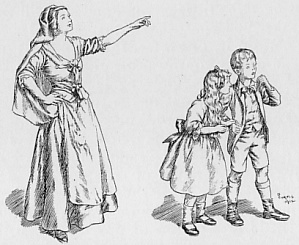
"Yes sir," said the woman, "but where is it?" |
.htm_cmp_poetic110_bnr.gif)